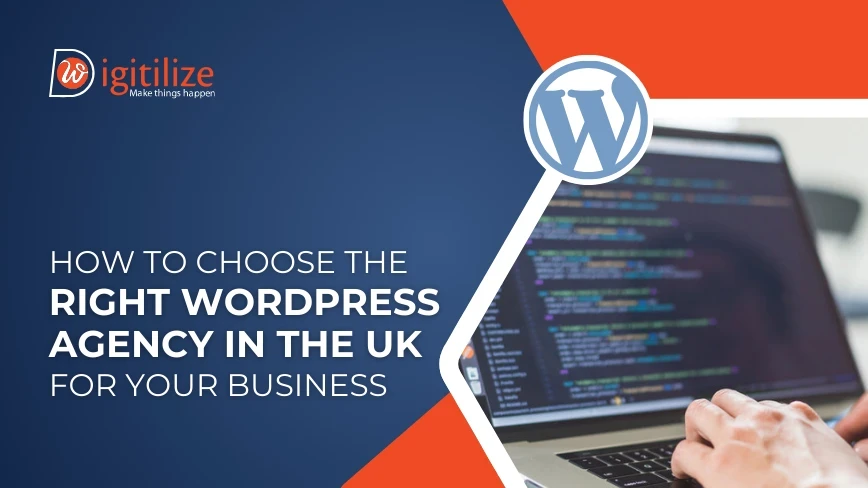How to Choose the Right WordPress Agency in the UK for Your Business
 Your website is more than just a digital storefront. It’s your brand’s first impression, sales hub, and customer service centre all rolled into one. An attractive WordPress website can boost credibility, attract leads, and drive business growth. But here’s the catch, not all WordPress agencies are created equal.
Many businesses struggle with unresponsive developers, slow project timelines, and websites that just don’t perform. Ever hired an agency that overpromised and underdelivered? You’re not alone. The wrong choice can cost you time, money, and missed opportunities.
That’s why we created this guide to help you navigate the selection process like a pro. We’ll walk you through a step-by-step approach to finding the right WordPress agency uk, avoiding common pitfalls, and ensuring your website becomes a powerful asset for your business. Let’s dive in!
Your website is more than just a digital storefront. It’s your brand’s first impression, sales hub, and customer service centre all rolled into one. An attractive WordPress website can boost credibility, attract leads, and drive business growth. But here’s the catch, not all WordPress agencies are created equal.
Many businesses struggle with unresponsive developers, slow project timelines, and websites that just don’t perform. Ever hired an agency that overpromised and underdelivered? You’re not alone. The wrong choice can cost you time, money, and missed opportunities.
That’s why we created this guide to help you navigate the selection process like a pro. We’ll walk you through a step-by-step approach to finding the right WordPress agency uk, avoiding common pitfalls, and ensuring your website becomes a powerful asset for your business. Let’s dive in!
Understanding Your Business Needs
Before you start looking for a WordPress agency, it is important to understand what you need.- Define Your Goals: What is the purpose of your website? Do you need it for brand awareness, lead generation, online sales, or customer support? Having clear goals will help you find an agency that specializes in your requirements.
- Find Key Features: Consider the functionalities you need. Will you need an online booking system, a payment gateway, multilingual support, or custom forms? List out the must-have features for your website.
- Think Long-Term: Your website should grow with your business. Ensure the agency can provide solutions that allow for future scalability and updates.
Evaluating the Agency’s Expertise
Not all WordPress agencies have the same skill set. Some focus on design, while others specialise in WordPress development, SEO, or custom functionalities. Here is how to evaluate their ability:- Check Their Specialisation: A good agency should have strong ability in WordPress. They should be able to build custom themes, develop plugins, and integrate third-party tools.
- Industry Experience: Does the agency have experience working in your industry? If they have built websites for businesses like yours, they will better understand your needs.
- Certifications and Partnerships: Some agencies have certifications like WordPress VIP or partnerships with WooCommerce. These credentials show a prominent level of ability.
Reviewing the Agency’s Portfolio and Case Studies
A portfolio is one of the best ways to assess an agency’s capabilities. Look for:- Design Quality: Are their websites visually appealing, modern, and user-friendly?
- Functionality: Do their websites include the features and integrations that you need?
- Case Studies: Some agencies provide detailed case studies showing how they helped businesses solve specific problems. These can give you insights into their critical thinking skills and creativity.
Checking Client Reviews and Testimonials
 Client feedback offers valuable insights into an agency’s reliability and professionalism. Here’s where to look:
Client feedback offers valuable insights into an agency’s reliability and professionalism. Here’s where to look:
- Google Reviews and Trustpilot: Independent review platforms offer genuine customer feedback.
- Clutch and Good Firms: These websites specialise in agency reviews and ratings.
- Testimonials on the Agency’s Website: While helpful, be mindful that agencies will only highlight positive feedback on their site.
- Red Flags to Watch For: Multiple negative reviews about missed deadlines, poor communication, or technical issues should be a warning sign.
Assessing Their Approach to SEO and Performance
Your website needs to be fast and easy to find on search engines. A professional WordPress agency should understand the following:- Search Engine Optimisation Best Practices: The agency should implement technical SEO, including meta tags, alt text, and structured data.
- Page Speed Optimisation: Google considers website speed as a ranking factor. Your agency should optimise images, use caching, and minimise scripts to improve load times.
- Mobile-Friendliness: With more users browsing on mobile, responsive design and development are essential.
Communication & Project Management
A web design project involves multiple stages, from planning to launch. Effective communication ensures everything runs smoothly. Consider:- How They Manage Projects: Do they follow Agile, Waterfall, or another method? Understanding their process helps you know what to expect.
- Communication Tools: Do they use project management tools like Trello, Asana, or Basecamp? Clear tracking of progress is important.
- Resolute Project Manager: Having one point of contact makes collaboration easier.
Checking Their Problem-Solving Approach
Every project faces unexpected challenges. A great agency knows how to solve problems efficiently.- Ask how they manage project delays or scope changes.
- Find out how they deal with technical issues or security vulnerabilities.
- Check if they provide contingency plans in case of emergencies.
- See if they can offer alternative solutions when a specific feature is too costly or complex.
Post-Launch Support & Maintenance
 Once your website is live, ongoing website maintenance is crucial. A good WordPress agency should offer:
Once your website is live, ongoing website maintenance is crucial. A good WordPress agency should offer:
- Security Updates: Regular updates protect against hacks and vulnerabilities.
- Bug Fixes: If something goes wrong, the agency should provide prompt fixes.
- Backup Services: Automated backups ensure you don’t lose important data.
- Performance Monitoring: Some agencies offer uptime checking to detect issues before they affect your business.
Making the Final Decision
After evaluating multiple agencies, it’s time to make your choice. Here’s a simple checklist to help you decide:- Does the agency have experience in your industry?
- Do they offer the features and customisations you need?
- Are their past clients satisfied with their work?
- Do they follow SEO and performance best practices?
- Is their communication and project management efficient?
- Do they provide post-launch support and maintenance?
Red Flags to Watch Out For
Not all WordPress agencies are created equal. While many are credible, a few red flags should make you think twice before signing a contract.· No Transparency on Pricing
A good agency will be clear about pricing from the start. If they avoid cost talks or give unclear answers, watch out for hidden fees. Some agencies attract clients with low quotes, then charge extra for must-have features like security, maintenance, or integrations. Always ask for a full cost breakdown before you sign anything.· Overpromising with Unrealistic Claims
Beware of agencies that promise instant Google rankings, overnight success, or unrealistic deadlines. SEO and web development are long-term processes, and genuine professionals know that quality work takes time. If an agency guarantees you a top spot on Google within days, they might be using black-hat SEO tactics that can harm your WordPress website in the long run. Always choose an agency that sets realistic expectations and follows ethical practices.· Poor Documentation and Ownership Issues
Your website is your business asset. You should have full control over it. If an agency doesn’t share clear documentation, it can lead to trouble later. Some agencies keep access to your domain, hosting, or backend. That makes it hard to switch providers or manage updates.
Always check the handover process. Make sure you get everything, login credentials, backups, and a user guide. Don’t depend on the agency for every small update.

